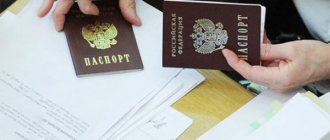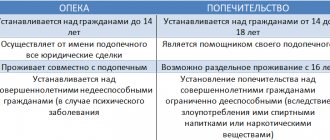Many citizens of the Russian Federation wonder what registration and registration are. What is the difference between these concepts? Does it exist at all? How can you obtain residence permit and registration under certain circumstances? Today we have to find out the answers to these questions. In reality, everything is much simpler than it seems. The main thing is to carefully study the existing legislation of the Russian Federation.
Historical reference
In Russia, citizens became familiar with the term “registration” back in Soviet times. It was during this period that the institution of registration appeared in the country. It was associated with the control of population movement across the territory of the USSR and the RSFSR. At the same time, active issuance of passports began.
In 1974, the majority of the population already had both identity cards and registration. Previously, this term served as a guarantor of good living and working conditions and indicated a special position in society. They were proud of their registration, many sought to obtain it. In order to acquire such a document, it was necessary to work for several years in unattractive and even menial jobs. Therefore, the mentioned term meant a lot.
Changes in the new time
But times are changing. Registration and registration - what's the difference? What do these concepts mean?
Registration used to be the place of permanent residence of a citizen. You could say this is the home address indicated in the passport. Registration, as already mentioned, gave various privileges.
Registration was called temporary registration. It allowed registration in housing for a certain period of time and indicated the temporary place of residence of the citizen. This is a less honorable registration option.
Only over time everything changed. In modern Russia, the concept of “registration” has almost become obsolete. Now this term has been replaced by registration. It follows that, in general, registration and registration are one and the same thing. But among the population these concepts are still divided. Why? What are the similarities and differences between these terms?
Similarities
Registration and registration - what's the difference? As you can already see, these terms are similar to each other. What do they have in common?
Today, both registration and registration have the following common features:
- allow citizens to reside in a particular territory;
- provide for payment of utility bills by residents;
- are allowed to receive services at their place of residence;
- carried out only with the permission of the apartment owner;
- displayed on paper (in the form of a stamp in a passport or a separate certificate);
- have a close connection with housing.
Nevertheless, there is also a difference between these concepts. And you need to know about it before registering (or temporarily registering) new residents in your home.
Foreigners
The procedure for registering foreigners and stateless persons is described in Federal Law No. 109-FZ dated July 18, 2006, as well as in the Administrative Regulations on the implementation of migration registration dated August 29, 2013. Migration registration of foreigners includes registration at the place of residence and registration at the place of stay.
Any foreigner staying in Russia for more than 7 days is required to register, otherwise he will face an administrative fine or deportation. Usually, all issues related to registering foreigners are dealt with by the receiving party, but if a citizen can prove that for objective reasons it is not able to do this, then he has the right to arrange everything himself.
Registration at the place of stay
Who is subject to registration: Persons permanently residing in Russia must register within 7 days after checking into their place of stay. Exceptional cases that require registration within only one day following the day of arrival:
- No specific place of residence.
- Accommodation in a sanatorium, holiday home or similar establishments.
- Shift work.
- Staying in a hospital or institutions involved in the rehabilitation of persons without a place of residence.
- Stay in an institution involved in the execution of administrative penalties.
Persons present in the country temporarily must register within seven days upon arrival at the place of stay, except for the following cases, which require registration within only one day following the day of arrival:
- Accommodation in a sanatorium, holiday home or similar establishments.
- Staying in a hospital or institutions involved in the rehabilitation of persons without a place of residence.
- Stay in an institution involved in the execution of administrative penalties.
For foreigners who are highly qualified specialists and members of their families, the time to register for migration is increased to 90 days from the date of entry.
If they have permanent registration in Russia and move around the country, then upon arrival at a new place for up to 30 days they do not need to register.
Foreigners are deregistered at their place of residence for the following reasons:
- Change of location.
- Leaving the country.
- Death of a citizen, declaring him dead or missing.
- Fictitious registration.
Legislation of the Russian Federation
The difference between registration and registration is not too big. But there are some key points that every citizen needs to know.
The point is that, according to established legislation, all citizens of the Russian Federation must have permanent registration. It won't be possible to do without it.
But registration may be missing. Anyone who has been living in the Russian Federation without permanent residence for more than 90 days should have it. Therefore, if you have a residence permit, there is no need to temporarily register in housing.
According to the law, you can have both permanent and temporary residence. Typically, this scenario occurs among citizens who have left to work in another city, but who plan to return home.
Registration of minors
Registration of children varies depending on age. Children under 14 years of age are required to live with their legal representatives. The younger generation from 14 to 18 years old is allowed to register separately with the permission of their parents.
The owner's consent is not required. The right is limited by the condition that the child is under 14 years of age.
You can register your child either permanently or temporarily. The state protects children equally, regardless of the type of registration.
We advise: What is the fine for lack of registration?
But there is a difference when deregistering minors:
- At constant. Parents themselves turn to government agencies for services when they need to move or sell their home.
- When temporary. The registration period coincides with the period of registration of the parents, and the right to use the premises is automatically terminated. Or checkout is possible earlier if the lease agreement is terminated early.
The registration of a child can occur without the permission of the owner, and the registration of a minor is prohibited without the consent of the legal representatives.
For non-privatized housing
Is there a difference between registration and registration? Yes, especially if we are talking about living in a non-privatized home. In this case, it is necessary to be extremely careful about the concepts being studied.
This is due to the fact that citizens who have permanent residence registration have more rights. Such persons may act as participants in privatization. This means that they will be allocated a share in the apartment/house.
At the same time, temporary registration does not give any special rights to those registered in the territory. Such a tenant will not be able to participate in privatization until he has a permanent residence permit in the privatized area.
Basic provisions of temporary registration
Temporary registration is carried out at the place of stay and must be recorded no later than 3 months after the move. Otherwise, it is an administrative offense with a fine.
Advantages and disadvantages
Temporary recording has a number of advantages:
- quickly processed;
- you can officially get a job;
- You can reduce the cost of utility bills at your place of permanent residence.
But temporary registration also has a number of disadvantages:
- it is impossible to obtain an insurance policy if a citizen is registered but not employed;
- You cannot get a mortgage loan;
- there is no access to the full list of government services.
If there is a certificate, a citizen has the opportunity to register a minor there without the consent of the owners.
How to apply
For registration, you must provide the following documents to the passport office:
- application form;
- copy of the passport;
- arrival slip;
- owner's consent to registration;
- a document confirming the owner's rights to this premises.
After checking all the documents, the applicant will be issued a certificate of temporary registration. This requires a maximum of 3 days.
Rights and obligations
Newly registered citizens are required to pay utility bills and maintain the property of the owners in order.
A citizen receives the following rights:
- you can complete all the documentation that a person needs at the moment;
- allowed to issue loans and credits;
- receiving social benefits;
- you can enroll your children in school and kindergarten;
- You can take part in the process of privatization of premises on the territory of which the citizen is registered.
Banks do not really trust citizens with temporary registration, so getting a consumer loan is theoretically possible, but quite difficult.
Validity
For foreign citizens, the period of temporary registration should be no more than 1 year. For citizens of the Russian Federation – maximum 5 years.
About eviction
Today in Russia it is not so difficult to explain the difference between registration and registration. The main thing is to carefully study the current legislation.
It is easier to evict a citizen from an apartment with temporary registration than it is to evict a citizen registered in housing on a permanent basis. The legislation of the Russian Federation currently prohibits depriving the population of the only roof over their heads. And if the registered person is also the owner of the apartment, there can be no talk of eviction. Only in exceptional cases will it be possible to bring the idea to life.
If there is a temporary registration, residents must leave the territory upon expiration of the issued document. Or the property owner can evict citizens through legal proceedings.
What is the difference
The registration process is carried out at the local FMS office. To do this, a certain group of citizens must contact the authority with a corresponding application.
.
Registration after receiving a residence permit must be carried out within 7 working days from the date of issue of the relevant special permit.
It is worth noting that failure to comply with these deadlines may result in administrative penalties. In some cases, if a person has foreign citizenship, he may be deported from the country.
As for registering a marriage with a residence permit, it implies registration at the place of actual residence of the spouse. The procedure in this case is carried out at the FMS office of a specific region. To carry out such registration, you must first deregister from your previous place.
Permanent registration of citizens of foreign states must be carried out by authorized representatives of the Federal Migration Service immediately on the day the person submits the relevant application. In this case, the state fee is 350 rubles.
Temporary registration with a residence permit is ideal for those citizens who:
- arrived on the territory of the Russian Federation for a temporary stay on the territory of health centers for the purpose of treatment;
- arrived in the region to carry out seasonal work on a rotational basis;
- are serving administrative punishment.
The current migration legislation excludes residence without registration, and this is due to the fact that a person without registration will not be able to undergo migration registration, use the services of the healthcare system or get a job legally
Interpretation
Registration and registration - what is the difference? Many note that another difference is the provision of a particular document.
Registration is usually issued in the form of a small certificate, which the citizen must always carry with him. It will allow you to receive state and municipal services. Not indicated anywhere else.
Registration is expressed by a stamp that is affixed to the citizen’s passport. No certificates, extracts or other interpretations.
When a person changes his permanent place of residence, he is given a new stamp and the old one is marked invalid. If a citizen changes his temporary place of residence, he is simply issued a new certificate, to which certain adjustments will be made.
Where to apply
Registration and registration - what's the difference? The main features of these concepts have already been studied. It should be remembered that you can acquire a temporary or permanent place of residence only with the permission of the homeowner. Also, the execution of these documents takes place in the same place.
Where exactly? Today, issues of registration and registration are dealt with by:
- FMS;
- migration departments of the Ministry of Internal Affairs;
- MFC (in some regions).
You can also apply for registration/registration through the State Services portal, but this scenario is extremely rare in practice.
Registrations in different types of housing
The status of the living space dictates some features when going through the registration procedure. They apply to both permanent and temporary registration.
In a municipal apartment
This type of housing involves renting an apartment from municipal authorities or the state. Registration is carried out at the request of the employer. The basis for moving in is a rental/social lease agreement.
After his own permanent registration, the employer can register his family members. You can register a relative only with the permission of all people registered in the apartment and the owner.
To carry out the procedure you will need:
- write an application for the right to use state property and have it certified by a notary;
- submit an application to the management company;
- Having received approval, go to the department of the Ministry of Internal Affairs with an application for registration and a package of documents.
Registration (of any kind) into a municipal apartment by strangers requires permission from the landlord. At the same time, you must obtain written consent from all residents of the apartment. Subsequently, it is necessary to make an adjustment to the contract indicating the period of occupancy.
In your own home
The procedure is standard and free. The owner can dispose of his property at his own discretion. Including the ability to register any number of people in the living space. Can be rented out with temporary registration. Or be allowed to live permanently.
If there are several owners, registration is carried out with the consent of all owners.
From 2021, it is allowed to obtain registration even at dachas if the owners have chosen it for permanent residence.
We advise: How to register without the owner of the apartment by power of attorney?
Staging is permissible if the dacha is located:
- in the city;
- on lands for individual housing construction.
In a communal apartment
A communal apartment can be municipal or consist of already privatized premises. If the room is owned by the tenant, he has the right to register other people (temporarily or permanently) according to the standard procedure.
When checking into a municipal fund room you will have to receive:
- consent of all residents;
- permission from the municipality if the future tenant is not a relative.
Local authorities may refuse registration if the number of people exceeds the norm established by the housing registration standard per person.
In dorm
Most hostels are owned by the city.
In this type of housing, temporary registration is carried out mainly:
- students;
- employees of the enterprise.
In rare cases, permanent registration is allowed if there is consent from the municipality and a lease agreement has been drawn up.
In a mortgaged apartment
In housing purchased with a mortgage, permanent registration is issued. The process proceeds as usual.
The future owner can register (temporarily or permanently) other persons. To do this, it is necessary to obtain the consent of the creditor bank. If Finnish the institution will see risks for itself in the registration, and a refusal will follow.
Registration of children in a mortgaged apartment has subtleties:
- the appearance of a child after purchasing a home obliges the parties to include the minor in the mortgage agreement as an applicant for the right of registration;
- registration of any person in an apartment (even a child) requires approval from the lender.
Documents for residence and registration
It is clear how registration differs from registration. What is the difference between these concepts? The answer will no longer cause trouble or put the person in an awkward position. In general, these terms are not much different from each other.
Registration and registration are approximately the same. The homeowner must contact the FMS with a corresponding application and a certain list of documents. Namely:
- passports of future residents;
- your own ID;
- departure and arrival sheets;
- extract from the BTI;
- certificate of family composition;
- a statement indicating the type of registration (temporary or permanent registration);
- consent of all homeowners for the operation;
- migration cards (for foreigners);
- birth certificates of children (if you plan to register the child).
It follows that registration and registration are really not much different. After some time, the citizen will either be given a passport, which will have a stamp with the address of his permanent place of residence, or will be given a certificate of temporary registration. Does a citizen have registration instead of registration? What is the difference? The answer to this question will no longer be a hassle!
What you should pay attention to
It is necessary to clarify that registration is carried out according to general rules that apply to the following situations:
- if you own several residential premises, it is enough to register in only one;
- In one premises, a citizen cannot obtain two types of registration at the same time, i.e. only permanent or temporary;
- constitutional rights are not limited in the absence of registration, this entails punishment in accordance with the Code of Administrative Offenses or the Criminal Code;
- temporary registration is canceled automatically at the end of the period; in order to be deregistered from a permanent address, you must apply to the passport office at the address of residence;
- types of registration of citizens of the Russian Federation and foreigners are government services, therefore they are carried out free of charge;
- Extracts/registrations for minor children are processed by their legal representatives; a child can submit an application independently only after receiving a passport at the age of 14;
- if registration is carried out on someone else’s premises, then the owner must come to the FMS or other government agency along with the citizen.
For any registration, a citizen is required to submit an application and other documents.
Temporary registration in a dormitory cannot exceed a period of three years. Find out from our article who to notify when changing your registration address.










